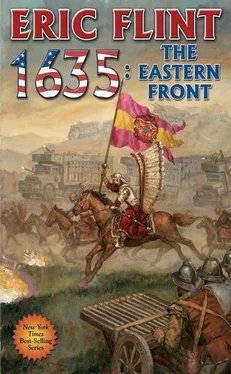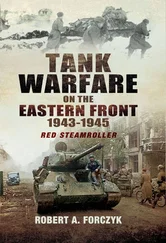Eric Flint - 1635 - The Eastern Front
Здесь есть возможность читать онлайн «Eric Flint - 1635 - The Eastern Front» весь текст электронной книги совершенно бесплатно (целиком полную версию без сокращений). В некоторых случаях можно слушать аудио, скачать через торрент в формате fb2 и присутствует краткое содержание. Жанр: Альтернативная история, на английском языке. Описание произведения, (предисловие) а так же отзывы посетителей доступны на портале библиотеки ЛибКат.
- Название:1635: The Eastern Front
- Автор:
- Жанр:
- Год:неизвестен
- ISBN:нет данных
- Рейтинг книги:5 / 5. Голосов: 1
-
Избранное:Добавить в избранное
- Отзывы:
-
Ваша оценка:
- 100
- 1
- 2
- 3
- 4
- 5
1635: The Eastern Front: краткое содержание, описание и аннотация
Предлагаем к чтению аннотацию, описание, краткое содержание или предисловие (зависит от того, что написал сам автор книги «1635: The Eastern Front»). Если вы не нашли необходимую информацию о книге — напишите в комментариях, мы постараемся отыскать её.
1635: The Eastern Front — читать онлайн бесплатно полную книгу (весь текст) целиком
Ниже представлен текст книги, разбитый по страницам. Система сохранения места последней прочитанной страницы, позволяет с удобством читать онлайн бесплатно книгу «1635: The Eastern Front», без необходимости каждый раз заново искать на чём Вы остановились. Поставьте закладку, и сможете в любой момент перейти на страницу, на которой закончили чтение.
Интервал:
Закладка:
The road would seem like the safest escape route, anyway. So, they'd follow it for two hours after the initial assault-well over six miles of a mountain "road" that was more in the way of a trail for pasturing cows. By the time they arrived at the ambush site where Kuefer and his cannon and militiamen were waiting, they'd be exhausted as well as terrified.
When the first deserters appeared around the bend, the militiamen began shooting them down. But, at Kuefer's prior orders, only a handful of them were firing, their best marksmen, and they were not firing volleys. Their fire was deadly because of its accuracy, but it wouldn't seem to the deserters that they were facing a sizeable opponent. Just some mountaineers trying to defend a local village; at worst, a small number of skirmishers from the same partisan group who'd attacked them.
Either way, especially as they were in a panic over the oncoming and relentless pursuit, Kuefer had figured the deserters would try to rush the barricade and simply drive over the presumed handful of men guarding it.
So it proved. At the last moment, one of the deserters spotted the mouth of cannon barrel hidden behind some branches, and tried to call out a warning.
But by then it was too late. "Fire!" Wilhelm shouted. The saker belched a double load of canister. At that point-blank range-the nearest deserter was less than ten feet away-the canister slaughtered every man in its path. It didn't spread very far, but Kuefer didn't care. The noise and the carnage would be enough to stun the now-completely-disorganized crowd of deserters. And as soon as he shouted the command to fire, all of the militiamen behind the abattis fired a volley. That took down another dozen men. By now, almost half of the band of deserters had been killed or wounded.
Such horrendous casualties would have routed even a disciplined unit of good soldiers. This rabble immediately tried to flee back up the road. Several of them dropped their weapons along the way.
Three of them tried to scramble up the slope to find safety in the forest beyond. But militiamen had been waiting in the woods also, and gunned them down as soon as they reached the crest.
Then, before the last of the Holk deserters had disappeared around the bend, Kuefer could hear more guns firing. Kresse had arrived, obviously.
It was almost comical, in its own way. Now the deserters came racing back. The cannon wasn't reloaded yet, but many of the militiamen had been able to reload their rifles. They started firing again. Not in a volley, but it hardly mattered.
By the time Kresse's men appeared, there weren't more than five deserters left alive and uninjured. You couldn't say "left standing," though, because all five of them were lying on the ground, trying to pretend they were dead.
Wilhelm shook his head. Fat lot of good that would do them.
If it had been left to Kuefer himself, he'd have simply had the men shot right then and there, along with any wounded deserters. But perhaps that was the reason Georg Kresse was in command, rather than him.
Unlike Wilhelm, Georg had taken into account the problem of disposing of the bodies. You simply couldn't leave that many corpses lying around, in an area with as many villages as the Upper Vogtland. Leaving aside the problem of the children-some would be terrified and upset at seeing the bodies; still worse, others would be thrilled and begin mutilating them-there was the ever-present danger of disease.
Digging a grave for that many bodies was a lot of work, though. Hard work. Kresse was a popular commander of irregular soldiers not only because he kept their casualties to a minimum but because he kept their labor to a minimum also.
So, he let the wounded live, and had them dragged off to the side of the road. He provided them with no medical care, though. If they died, they died-and, indeed, several did in the time it took the five survivors to dig a mass grave some thirty yards into the woods. Wilhelm knew that the only reason Georg was keeping the wounded alive at all was to give the toiling grave-diggers the hope that they might be allowed to live.
Digging the grave took almost the whole day. By the time all the bodies were hauled to it and dumped in, it was late afternoon. That work was done by the deserters also, of course. Kresse's men and the militiamen spent a pleasant day lounging in the shade and watching.
By sundown, it was all done, except for shoveling the dirt back over the corpses. Unfortunately, that last bit of work would have to be done by Kresse's people and the militiamen.
At Kresse's command, the five survivors were hauled to the edge of the grave. Two of them began shouting protests, but only one made any attempt to resist. He was immediately clubbed senseless and fell into the grave. The other four were shoved roughly to their knees.
"All right," said Kresse. "Shoot them."
Three of the four bodies fell into the grave on their own. The last one was sent in with a rough boot.
Kresse pointed to the one still-living Holk soldier, the one who'd been beaten unconscious. "Him too."
"Bury him alive!" shouted one of the militiamen. That was old Selig Hirsch, the local tanner. Kuefer didn't blame him. One of his sons had been murdered by soldiers a few years back, along with two of the son's children.
But Kresse shook his head. "We're not savages. Shoot him, I said."
Wilhelm had been expecting that order also, and did the shooting himself. Georg Kresse was as harsh a man as ever lived in these mountains. But only his enemies claimed he was cruel. None of his irregulars would have used that term, not would any of the farmers and townsmen in the Upper Vogtland. He was simply, and fortunately, what the times had produced.
By the time they returned to the mine, Kresse had come to a decision. The first person he spoke to was the woman with whom he shared a small cell in the mine constructed from old timbers. That was Anna Piesel, his betrothed.
"Anna, I want you to go to Magdeburg." He hooked a thumb at Kuefer. "I'll send Wilhelm and some other men as an escort until you're into Thuringia. After that, you should be safe enough. Take Friedrich and Hannelore, also. They could both use some rest in a tavern, and they're old enough to pass as your parents."
He smiled, seeing Piesel's little glare. She was a good woman, but a bit vain about her looks. "I said, 'old enough.' I didn't claim there was any resemblance." Friedrich was downright ugly, and the best you could say for Hannelore's appearance was "dumpy."
"Why do you want me to go to Magdeburg? That'll take weeks, Georg!"
"At least six, I'm figuring. Quite possibly more. But we're not going to be doing much here during that time. It'd be idiotic for us to launch any major attacks, when the Swedes and the USE army are going to be spending those same weeks pounding the Saxon army into a pulp. I figure we may as well just sit and wait. The real struggle will come then, not now. What sort of Saxony will emerge, once the elector's driven out? You know the Swedes, Anna. Gustav Adolf will set up the same sort of military administration he's used in other conquered provinces. That is not what we want. We want a republic in Saxony, nothing less."
Kuefer spoke up. "But, Georg…?the Americans…"
"What about them? Be realistic, Wilhelm. Even if they're inclined themselves toward a republic, it's not an issue over which they'd risk a rupture with Gustav Adolf." Kresse shook his head. "?'Prince of Germany,' the damn fools call Stearns. But I notice that's never stopped him from making compromises with royalty and nobility every time he turns around."
"That's not fair, Georg," Piesel said mildly.
"Maybe not. But I'm still not relying on the good graces of the up-timers. No, we need to get the Committees of Correspondence involved. And that's why I'm sending you to Magdeburg. I want Richter, Anna. Tell her we want her to come to Dresden after the elector's gone."
Читать дальшеИнтервал:
Закладка:
Похожие книги на «1635: The Eastern Front»
Представляем Вашему вниманию похожие книги на «1635: The Eastern Front» списком для выбора. Мы отобрали схожую по названию и смыслу литературу в надежде предоставить читателям больше вариантов отыскать новые, интересные, ещё непрочитанные произведения.
Обсуждение, отзывы о книге «1635: The Eastern Front» и просто собственные мнения читателей. Оставьте ваши комментарии, напишите, что Вы думаете о произведении, его смысле или главных героях. Укажите что конкретно понравилось, а что нет, и почему Вы так считаете.












